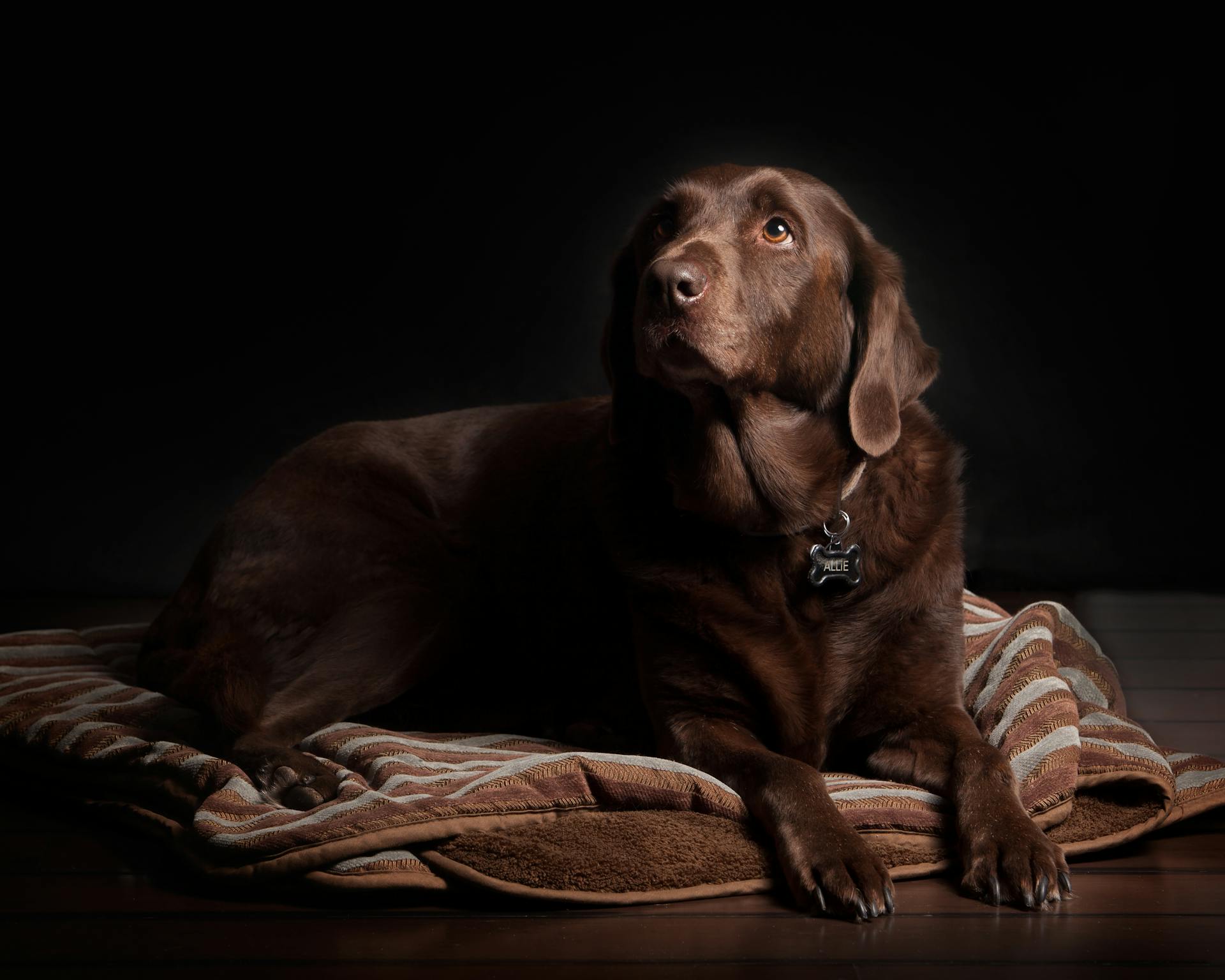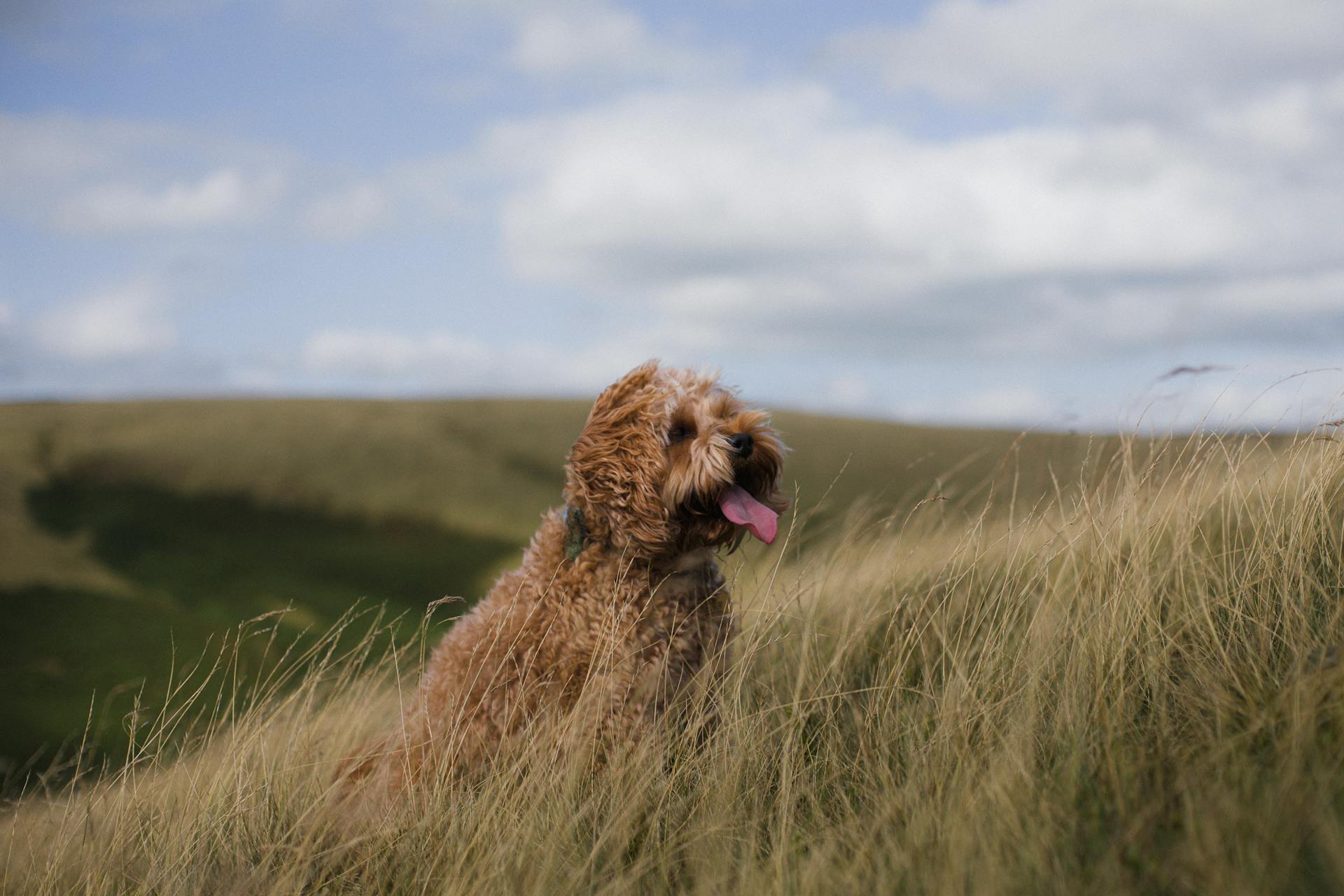
If your dog eats white chocolate, they may face some serious health issues if they eat enough of it. Although not as common as dark or milk chocolate, white chocolate still contains a certain amount of theobromine, which is toxic to dogs. Symptoms range from nausea to seizures and can be life-threatening in extreme cases.
The best course of action is to immediately contact a veterinarian for help if your dog has eaten any amount of white chocolate. If it has only been a few minutes since their indulgence, the vet may direct you to induce vomiting in your pup using hydrogen peroxide or salt solutions under their supervision only. If they have already been successful at digesting it and the symptoms are mild, activated charcoal might be suggested by your vet too - this helps prevent excess absorption and gets rid of toxins that remain in the gastrointestinal tract before these get absorbed again into circulation. You should always consult with a medical professional regrading any medical issues regarding your pets before administering any treatment yourself!
It is also important to remember that prevention is key when it comes to keeping our furry friends safe and healthy; avoiding leaving any type of chocolates lying around where curious noses will find them and monitoring access to foodstuffs containing cocoa/chocolate in general are important measures you can take as an owner. Being aware that not all types pose equal danger - dark being far more concerning than white - will also help keep tabs on what can prove unhealthy for them if ingested!
What should I do if my dog ate a large amount of chocolate?
If your dog has eaten a large amount of chocolate, it's important that you take immediate action. Chocolate is toxic to dogs and can cause serious health complications if not treated quickly.
The first thing you should do is call your veterinarian or the closest pet emergency facility and alert them to the situation. Depending on how much chocolate was consumed and what type of chocolate it was, they may advise that you bring in your pup for treatment right away.
Secondly, if vomiting isn’t already occurring, try to get your dog to vomit as soon as possible by giving them hydrogen peroxide (2 teaspoons for every 10lbs or 4.) Be very careful when doing this yourself; check with a medical professional before proceeding with any medical treatment for your pup.
Prevention is also key when it comes to chocolate ingestion in pets so make sure all sweets are out of reach from curious canine mouths! Keep all chocolates out of reach at all times even during holidays and special occasions when the sweet treats are most plentiful! Additionally, consider investing in some meals-distracting chew toys that can help keep burgers from getting into mischief while you’re away too!
What should I do if my dog has eaten dark chocolate?
If you know or suspect your dog has eaten dark chocolate, it’s important to act quickly as dark chocolate can be very toxic for dogs.
The first step is to determine how much dark chocolate your dog ate and then contact your vet or an animal poison control center right away (it’s a good idea to have their contact information on hand before an emergency occurs). Medical professionals will help you determine the best course of action depending on the amount of ingestion. In some cases, inducing vomiting may be necessary.
Next, limit your pet’s movement and do not give anything else by mouth except what the veterinarian instructs for purging the stomach contents. Provide plenty of fluids and monitor carefully for any signs of distress including vomiting, diarrhea or changes in energy levels. If these occur, contact your vet immediately as additional medical treatment could be needed in order to reduce any potential risk from ingesting dark chocolate.
Finally, take steps to prevent this from happening again in order to keep your pet safe! Keep all types of chocolates away from pets and out of reach at all times. If you suspect that a family member or guest has brought anything with dark chocolate into the house that could put a curious pup at risk – make sure it is kept secure until everyone is prepared to leave with their treats intact!
What should I do if my dog ate a chocolate bar?
If your dog just consumed a chocolate bar, it's important to act quickly. Chocolate can be toxic for dogs, and serious health problems can arise if left untreated.
First things first – try to determine how much chocolate your dog ate, as well as what type of chocolate it was. Darker chocolates such as baking or gourmet varieties are more dangerous than light chocolates (e.g., white, milk). The level of toxicity will depend on the size of your dog and the amount that was eaten; the darker and more bitter the chocolate, the worse it likely is for them.
If your pup has already vomited up some or all of the chocolate, remove any remaining pieces from around their mouth and monitor closely for symptoms which could affect organs such as their heart (rapid heartbeat), lungs (labored breathing), stomach (vomiting/diarrhea) or nerves (seizures). If you're worried about negative effects then head straight to an emergency room where they'll assess your pet's condition and treat accordingly.
In addition to medical attention, you'll also want to encourage hydration in order to reduce any potential damage from other toxins contained within the chocolate bar. Offer plenty of clean fresh water after consuming something potentially hazardous like this, but be sure not let them drink too much at once in an effort to avoid bloating or other digestive issues that may be triggered by drinking large amounts at once—do this gradually over time instead so their system won't get overloaded with liquid all at once following ingestion..You may also want to consider providing a special treat like peanut butter or diced bread/toast soaked in water; this should help offset some cravings associated with eating something sugary while aiding digestion simultaneously!
What should I do if my dog ingested a chocolate-flavored food?
We’ve all heard that chocolate is dangerous for dogs, but sometimes it’s difficult to remember or resist when your pup looks at you with those big, begging eyes. Unfortunately, if your four-legged friend has consumed a chocolate-flavored food, there are several steps you should take in order to ensure their safety.
First and foremost: stay calm! Dogs are sensitive animals and can sense when their owners are panicked or uncertain. This won’t help the situation at all – instead, focus on providing the best care possible while remaining composed. As unpleasant as this may be for you and your pup, try not to show emotion so that they don’t pick up on it during this difficult time.
Once you have got yourself under control and taken a deep breath (or two!), check the packaging of whatever dog food they consumed – if nothing poisonous was ingested then your pup is likely in good health (aside from an upset tummy). If any kind of artificial sweetener was present in what they ate then contact a local vet for further guidance as soon as possible – these sweeteners can be hugely damaging even in small doses!
If what was ingested does indeed contain traces of actual chocolate then look out for the following signs of complications: vomiting/diarrhea; trembling/shivering; increased urination/defecation; muscle problems such as weakness or incoordination; hydration issues due to dehydration from excessive urinating; increased heart rate along with an accelerated breathing rate which could lead to panting/drooling excessively; lastly - seizures and coma occur in most serious cases so aim for early intervention if signs do become noticeable!
Symptom manifestation usually occurs around 6 hours after ingestion however it may take longer so keep checking during this window period before seeing a vet should symptoms arise. At least call ahead to make sure they know how best manage any potential emergency consultation too - better safe than sorry!
In conclusion - whilst accidents do happen try and prevent them occurring again by avoiding feeding your dogs anything containing actual chocolate components going forward.And act quickly if unfortunate enough consume by either managing them at home appropriately or seeking medical attention where necessary. Good luck!
You might like: How to Stop Dog from Eating Other Dogs Food
How can I tell if my dog has eaten chocolate?
Chocolate can be dangerously toxic for dogs, so it's important to be able to recognize signs of chocolate poisoning if your canine companion runs into this treat. Knowing the warning signs can help you and your dog keep safe—and get the help they need quickly in case of an emergency.
The first indication that your pup may have eaten chocolate is a change in behavior or appearance. A common symptom is vomiting or diarrhea, which are both readily noticeable and may happen soon after the ingestion of a significant amount of chocolate. Your pet may also appear weak or lethargic and might start acting aggressively or uncharacteristically nervous. All these signs should not be taken lightly—they could suggest that they’ve consumed toxic levels of caffeine and stimulants contained in most kinds of candy bars as well as cocoa beans.
If your dog has no visible symptoms yet, you should also look out for excessive thirst; increased urination; fast breathing; racing heartbeat; muscle twitching and tremors; restlessness and hyperactivity; lack of coordination (including an uncoordinated gait); seizures, coma, or death - all suggestive of ingesting too much dark or baking chocolate which contains higher concentrations of theobromine than white chocolate does.
If any combination these signs present themselves it’s important to contact your veterinarian immediately – don't wait until more serious symptoms develop as it may then be too late for treatment to work effectively! There are treatments available depending on how soon you act after Chocolate ingestion - however prompt action must always be taken due to how rapidly toxins build up when significant quantities are involved.
By keeping informed about potential risks like this one associated with everyday foods like Chocolate, you can protect yourself and your pup from preventable harm!
Recommended read: How Soon after Eating Chocolate Do Dogs Get Sick
What are the symptoms of chocolate toxicity in a dog?
Chocolate toxicity in dogs is an often overlooked, but serious danger to your pet's health. While a little bit of chocolate may not hurt your pup, it's important to understand the symptoms of chocolate toxicity so that you can prevent any major health issues.
The most common symptom of chocolate toxicity in dogs is vomiting and diarrhea, which will usually present within two hours of ingestion. Your pup may also be lethargic and have difficulty breathing. Seizures, tremors, rapid heart rate, changes in behavior such as increased irritability or aggression can also be warning signs that the dog has ingested too much chocolate.
It's important to note that some breeds and sizes of dogs are more sensitive to over-consumption of chocolate than others - smaller breeds like Chihuahuas are particularly vulnerable - so if these symptoms persist even after a single incident you should contact your vet right away for assessment and treatment options. Additionally if the dog consumed large amounts of dark or semi-sweet chocolate it could require urgent medical attention due to the possibility for organ damage caused by its higher levels of cocoa residue –so again it’s best practice whenever there are suspicious signs as discussed above to contact your veterinarian immediately!
Intriguing read: Big Fluffy White Dogs Breeds
Sources
- https://www.usatoday.com/story/news/nation/2022/03/08/dog-ate-chocolate-what-to-do/9430312002/
- https://fluentwoof.com/my-dog-ate-white-chocolate/
- https://petloverguy.com/dog-ate-dark-chocolate/
- https://purrfectnpawesome.com/dog-ate-white-chocolate/
- https://fluentwoof.com/my-dog-ate-dark-chocolate/
- https://www.akc.org/expert-advice/health/what-to-do-if-your-dog-ate-chocolate/
- https://www.petpoisonhelpline.com/pet-tips/what-should-i-do-if-my-dog-ate-a-chocolate-bar/
- https://adogtrainingcourse.com/health-issues/dog-has-eaten-chocolate/
Featured Images: pexels.com


